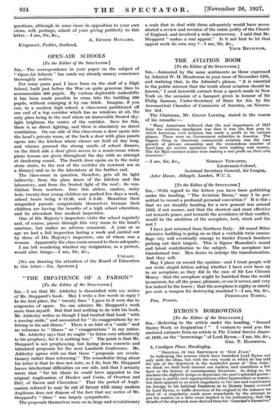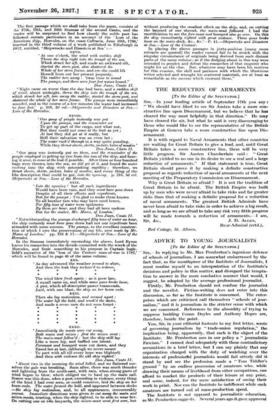BYRON'S BORROWINGS
[To the Editor of the SPECTATOR.] SIR,—Referring to the article under the heading, " Second Storey Work or Inspiration ? " I venture to send you the enclosed extracts from an article in The United Service Journ- al, 1829, on the "borrowings " of Lord Byron.—I am, Sir, &c.i GEO. T. HAMMOND.
3, Cardigan Place, Headingley.
" ORIGINAL dr THE SurewnEcir DON JUAN.'
In indicating the sources which have furnished Lord Byron not only with the ideas, but with the very words in which he has told his tale of the shipwreck in the wonderful poem of ' Don Juin,' we think we shall both interest our readers, and contribute a few facts- to the history of contemporary literature. In doing so, we disclaim the slightest design to depreciate the poet's splendid genius : it is easy to justify such appropriations either byprecedent or reason ; but there appears to us much singularity in the care and contrivance. (so foreign to his- habitual franlmees as to literary loans) evinced by Lord Byron, to baffle detection of his original in the instance we treat 'of—a singularity made more remarkable by the attempt to put his readers on a false scent implied in his insinuation, that the 'details of the shipwreck were derived from his Gnu:idea's Narrative.' The first passage which we shall take from the poem, consists of the. 27th, 2 , and 2gth Stanzas of the second Ceinto, and the reader will be surprised to find how closely the noble poet has ,followed . certain particulars in an account of the ' Loss of the . American ship, Hercules, on the coast Caffraria, June 16th, 1796,' inserted in the third volume of a work published .in Edinburgh in 1812, entitled, ` Shipwrecks and Disasters at Sea ' :—
XXVII.
' At one o'clock, the wind with sudden shift Threw the ship right into the trough of the sea, Which struck her aft, and made an-awkward rift, .Started the stern-post, also shattered the Whole of her stern frame, and ere she could lift Herself from out her present jeopardy, The rudder tore away : 'twas time to sound The pumps, and there were four feet water found."
Don Juan, Canto II.
! Night came on worse than the day had been, and a sudden shift of wind, about midnight, threw the ship into the trough of the sea, which struck. her aft, tore away the rudder, started the stern-post, and shattered the whole of her stern, frame. The pumps were immediately sounded, and in the course of a few minutes the water had increased to four feet.' p. 316, 3d vol.—Shipwrecks and Disasters at Sea.— Loss of the Hercules.
xxviu.
' One gang of people instantly was put Upon the pumps, and the remainder set _ To get up pert of the cargo, and what not, But they could not come at the leak as yet ; At last they did get at it really, but Still their salvation was an even bet ; The water rusted through in a way quite puzzling, While they thrust sheets, shirts, jackets, bales of muslin ' Den Juan, Canto II.
. ! One gang seas instantly put on them, and the remainder of the
• people employed in getting up rice from the run of the ship, and heav- ing it over, to come at the leak if possible. After three or four hundred bags were thrown into the sea, we did get at it, and found the water rushing into the ship with astonishing rapidity ; therefore, we thrust sheets, shirts, jackets, bales of muslin, and every thing of the like description that could be got, into the opening. p. 316. 3d viol. Shipwrecks at Sea.--Loss of the Hercules.
Into the opening ! but all such ingredients Would have been vain, and they must have gone down Despite of all their efforts and expedients,
But for the pumps : -I'm glad to make them known To all brother tars who may have need hence,
For fifty tons of water were upthrown By them per hour, and they had all been undone But for the maker, Mr. Mann, of London.'
Don Juan, Canto II.
' Notwithstanding the pumps discharged fifty tons of water an hour, the ship certainly must have gone down had not our expedients been attended with some success. The pumps, to the excellent construc- tion of which I owe the preservation of say life, were made by Mr. Mann of London.' pp. 316 St 17.—Shipwrecks at Sea.—Loss of the Hercules.
In the Stanzas immediately succeeding the above, Lord Byron leaves his researches into the details connected with the wreck of the Hercules, and finds something to his purpose in Captain Ingle- field's narrative of the loss of the Centaur man-of-war in 1782,' ' which will be found in page 49 of the same volume.
` As day advanced the weather seemed to abate, And then the leak they recken'd to reduce,
* * * *
The wind blew fresh again : as it grew late, A squall came on, and while some guns broke loose, A gust, which all descriptive power transcends, Laid, with one blast, the ship on her beam ends.
XXXI.
There she lay motionless, and seemed upset The water left the hold, and waeh'd the decks, And made a scene men do not soon forget : * * * * * *. • xxxn.
Immediately the masts were cut away, Both main and wizen ; _first the-wizen went ; The main-mast follow'd ; but the ship still lay Like a mere log, and baffled our intent.
Foremast and bowsprit were cut down, and they Eased her at last, (although we never meant To part with all till every hope was blighted) And then with violence the old ship righted.'
Don Juan, Canto II.
About-two in the morning the wind lulled, and we flattered our- selves the gale was breaking. Soon after, there was much thunder and lightning from the south-east, with rain, when strong gusts of wind began to blow, which obliged me to haul up the main sail. Scarce was this done, when a gust,-exceeding in violence, every thing of the kind I had ever seen, or could conceive, laid the ship on her beam-ends. The water forsook the hold, and appeared between decks —the ship lay motionless, and, to all appearance, irrecoverably overeat. Immediate directions were given to cut away the main and rnizeti-masts, trusting, when the ship righted, to be able to wear her. On eating one or tvlto lanyards, the mizen-mast went first over, but without producing the smallest effect, on the ship, and, on cutting the lanyard of one shroud, the main-mast fol&to. I had the mortification to see the fore-mast and bowsprit also go over. On this the ship immediately righted with great violence. Three guns broke those on the main-deek, &c., &c.'—P. 41.—Shipwrecks and Disasters at Sea.—Loss of the Centaur.
In placing the above passages in jeixta-poSition [many more extracts are quoted] the reader cannot fail to be struck with the singular circumstance of originals being derived from such distant parts of the same volume ; as if the dodging about in this way were intended to perplex and defeat the researches of that enquirer who might hit on the clue. But, whatever may have been his motives for this evasion, the skill and patience with which the illustrious writer selected_ and wrought his uttered materials, are at least, as remarkable as the success which crowned them."























































 Previous page
Previous page